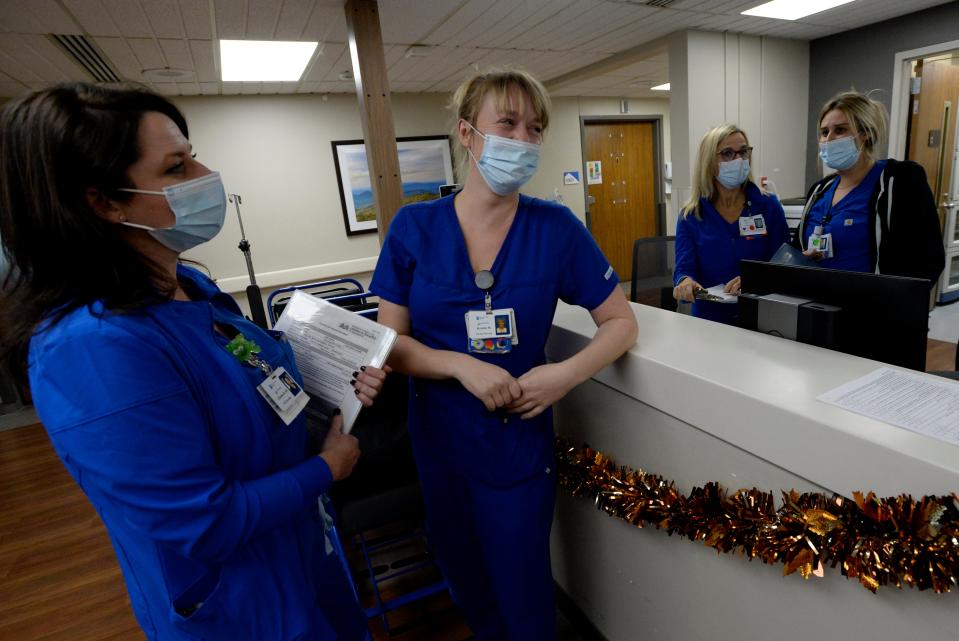Health care industry's greenhouse emissions are huge. Time to lead on sustainability.
When events like extreme temperatures, smoke from wildfires, tornadoes and floods, and poor air quality hit our communities, our physical, mental, and emotional health are all directly impacted.
Now – perhaps more than ever – protecting our personal health also means protecting the health of our environment. And the industry tasked with creating better health outcomes, the health care sector, should be leading the charge.
It’s time for those of us in health care to lean in.
With Nashville known as the nation’s health services capital, we have a real opportunity to be a global leader when it comes to protecting the health of our bodies, community, and planet.
Another view: On Earth Day 2023, here’s how we can think globally and act locally | Opinion
New certification for health facilities encourages sustainability
Ironically, the health care sector has a disproportionately large carbon footprint. It’s estimated that greenhouse gas emissions from the U.S. health care industry represent an incredible 10% of all emissions nationwide, and a shocking 27% of total health care emissions globally.

The work of keeping people healthy should include recognizing and reducing health care’s outsized share of carbon emissions. Any solutions will require time, dedication, expert guidance, and inspired organizations to pave the way.
Luckily, we are seeing new models and initiatives emerge. On Sept. 18, The Joint Commission – the nation’s oldest and largest standards-setting and accrediting body in health care – unveiled a new certification program that will take effect on Jan. 1, 2024. Acute care hospitals and critical access hospitals who choose to participate will name a sustainability point person at their facility and be required to measure and set goals to reduce at least three key sources of greenhouse gas emissions or waste.
The Joint Commission’s Enterprise President and CEO Dr. Jonathan B. Perlin explained in this announcement, “We want to work with the momentum of health care organizations leading the way in sustainability excellence – inspiring and guiding others that want to prioritize greener practices.” This process is an exciting and potentially far-reaching way for the health care sector to actively engage in caring for both their patients and the environment of the communities they serve, as well as receive recognition for their sustainability efforts.
It’s also a way for the health care sector to reduce costs. Health care is more than twice as energy intensive as schools or offices. And forward-thinking health systems like Gundersen Health System in Wisconsin found they could decrease energy consumption by more than half (53%) and save more than $1 million each year by making a front-end investment in efficiencies like new light fixtures, geothermal heat pumps, biomass boilers replacing traditional natural gas ones, and controls on heating and ventilating systems.
Hear more Tennessee Voices: Get the weekly opinion newsletter for insightful and thought provoking columns.
Four steps Ascension has taken to reduce its carbon footprint
Another organization boldly stepping up is Ascension, a national health care system with a 125-year history in Middle Tennessee through Ascension Saint Thomas.

Indeed, Ascension nationally has adopted initiatives to help address the effects of climate change that will impact the communities we serve, and formally committed to achieving net zero carbon emissions and zero waste by 2040, and reducing carbon emissions by 50% by 2030 in their facilities across the nation.
As of June, Ascension had already reduced emissions by 9.4% in its first full year. Locally, Ascension Saint Thomas believes their roadmap toward net zero can be adopted and deployed widely by other health care organizations to better care for our environment, and thus to the health of all people. This level of commitment will lead to long-term change.
Here are a few of the initiatives Ascension Saint Thomas has successfully implemented locally:
Supplier relationships: “Responsible Supply Chain” focus seeks to influence suppliers’ carbon reduction efforts by incorporating carbon reporting contractual terms within agreements when possible.
Building with intention: Thoughtful building design can yield positive environmental results. Ascension Saint Thomas is prioritizing the use of environmentally sustainable and energy efficient materials in new construction and design, including in its new Surgery & Critical Care Tower and Spine Institute on the Midtown Campus.
Cultivate for tomorrow: When celebrating 100 years at Ascension Saint Thomas Hospital Midtown, a partnership with Root Nashville – a campaign orchestrated by Metro government and local nonprofit NashvilleHealth – resulted in 100 trees being planted across the campus. Annually, these trees will prevent an estimated 12,000 gallons of stormwater runoff, store more than 3,000 pounds of carbon, and remove 7 pounds of pollutants from the atmosphere.
Rethinking food waste: Health care facilities prepare an immense amount of food every day, and as a byproduct generate a high volume of food waste. To reduce this waste, Ascension Saint Thomas invested in food digesters at the Midtown, West, Rutherford and River Park hospitals to efficiently process food scraps that would otherwise end up in landfills.
This is just the starting point. They are also looking into electrifying their fleet and enhancing recycling efforts — including medical supplies and equipment. Ascension Saint Thomas proves to be a compelling model that other care organizations can follow.
The health of the next generations of Middle Tennesseans is intrinsically tied to the health of our environment. Leveraging the responsible work that Ascension Saint Thomas and other national leaders are demonstrating, Nashville’s health care industry can practice habits today that produce a healthier tomorrow. Together, we will make a difference.

Sen. William H. Frist, MD is a heart and lung transplant surgeon, former U.S. Senate majority leader, and the chair of the Global Board of the Nature Conservancy, the largest conservation organization in the world.
Fahad Tahir is the president and CEO of Ascension Saint Thomas.
This article originally appeared on Nashville Tennessean: Health care industry must lead by reducing its huge carbon footprint

